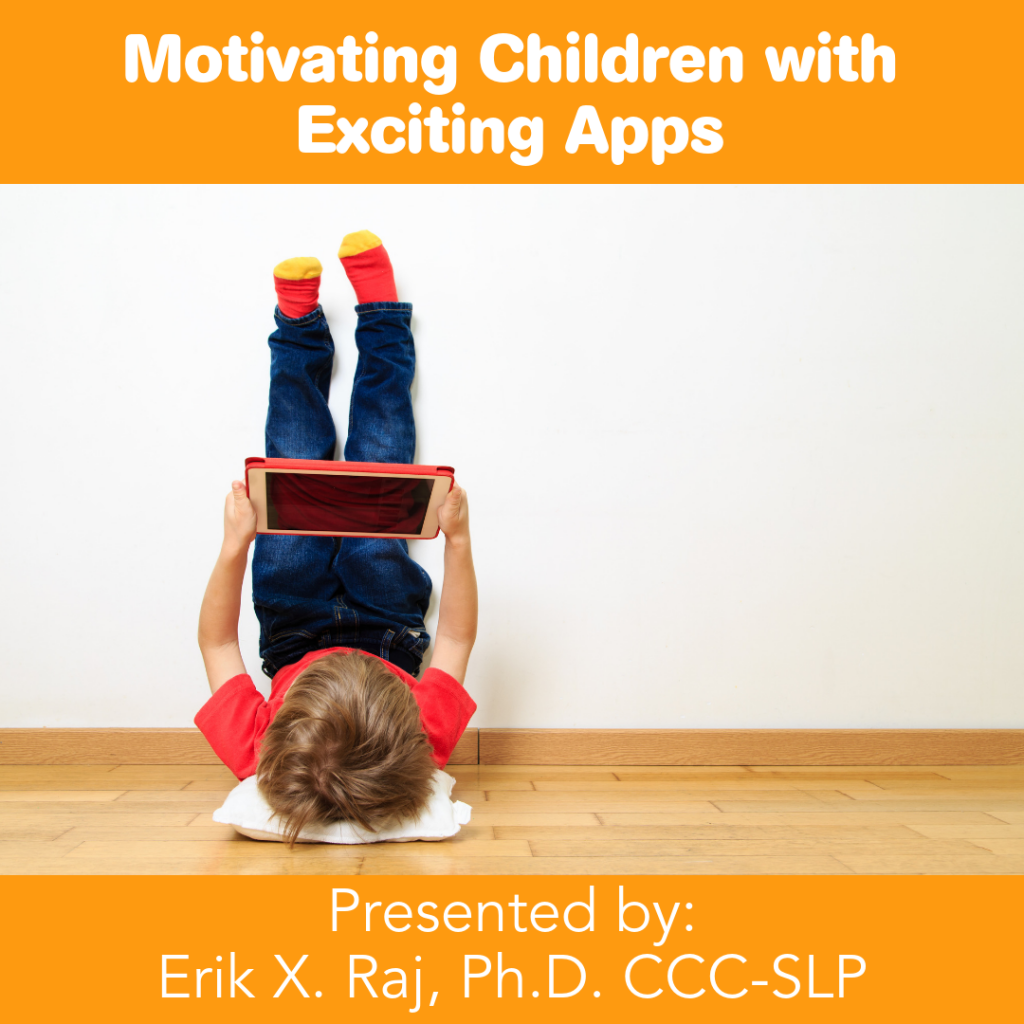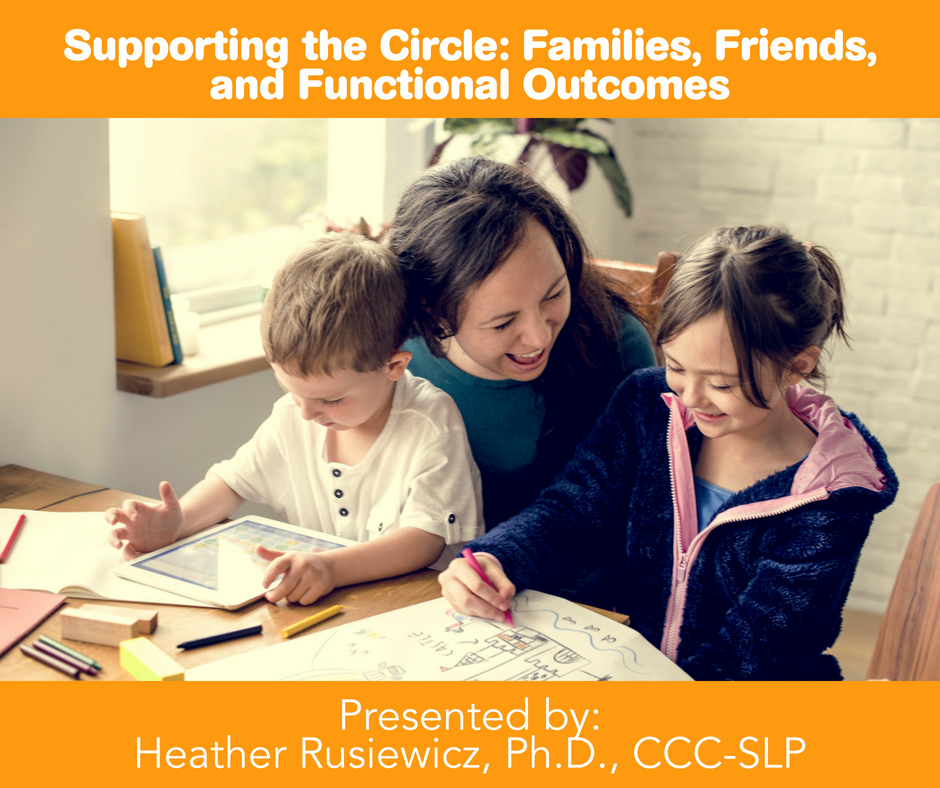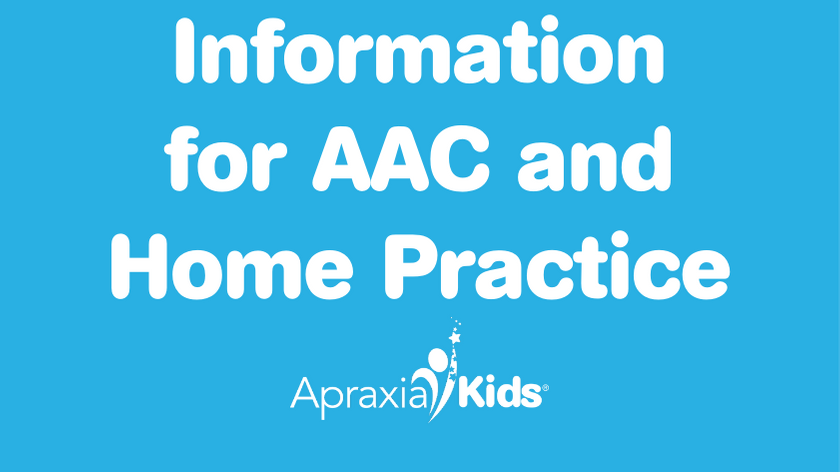
16 Apr Information for AAC and Home Practice
Apraxia Kids has compiled a learning module with information about AAC and home practice.
Free Webinars
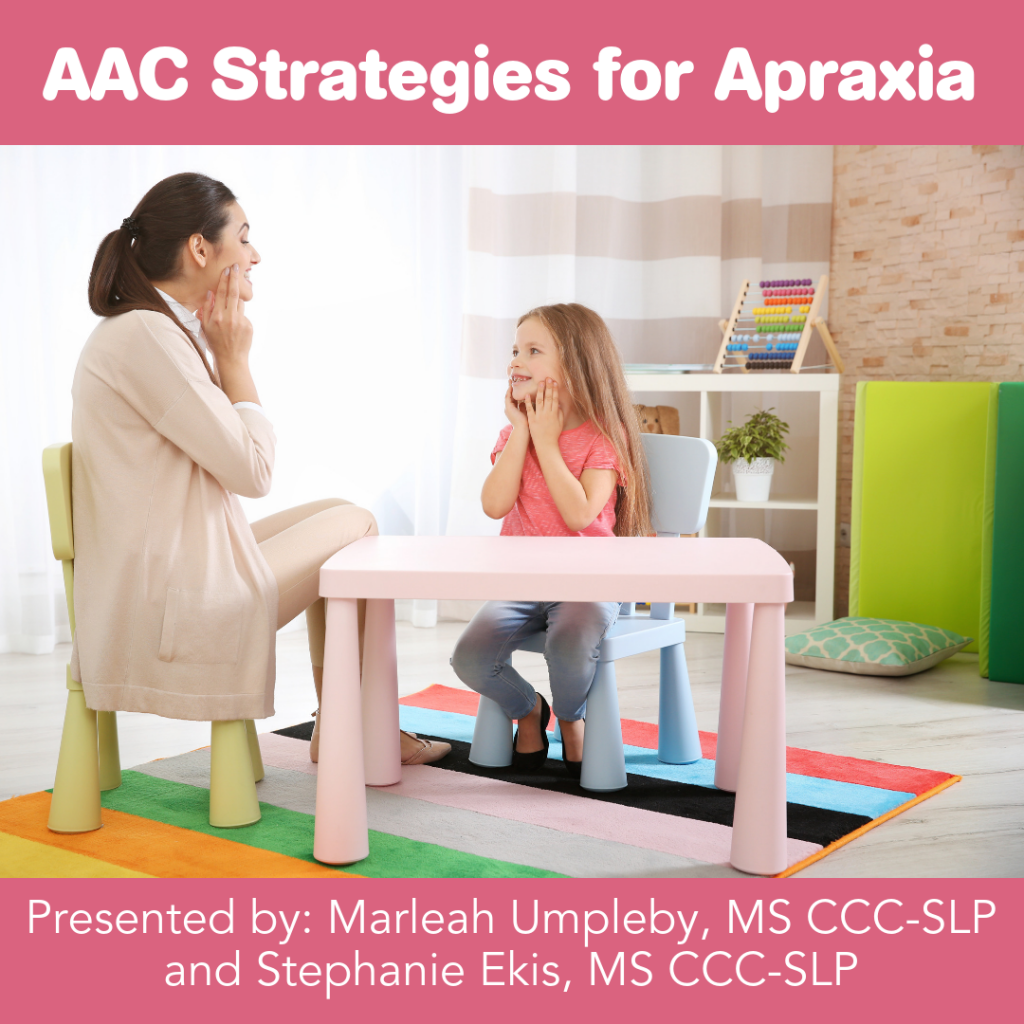 AAC Strategies for Apraxia
AAC Strategies for Apraxia
Presented By: Marleah Herman-Umpleby, M.S., CCC-SLP and Stephanie Ekis, M.S., CCC-SLP
This session will provide 10 easy to implement suggestions for using AAC technology, and supports to encourage language and literacy growth in individuals with childhood apraxia of speech (CAS). The importance of social and meaningful interactions (and not just requests!), literacy development, curriculum supports and resources will all be discussed. Information and valuable tools about being a great communication partner will also be shared to help families and teams provide optimal circumstances for growth, literacy and engagement. AAC does not have to be presented *instead* of use of natural speech for individuals with CAS. Watch this session to learn more about the benefits of using it as a part of a speech and language intervention program!
https://www.apraxia-kids.org/webinar_library/aac-strategies-for-apraxia/
Additional Webinars
Motivating Children with Exciting Apps
Presented By: Erik X. Raj, Ph.D., CCC-SLP
This hands-on course is designed to meet the needs of school-age children and adolescents with various communication difficulties by introducing them to photo-based iPad apps. Through the discussions and demonstrations of the highlighted apps, parents and speech-language pathologists will learn how to manipulate personal photos in an effort to motivate and teach the young learners in their lives.
https://www.apraxia-kids.org/webinar_library/motivating-children-with-exciting-apps/
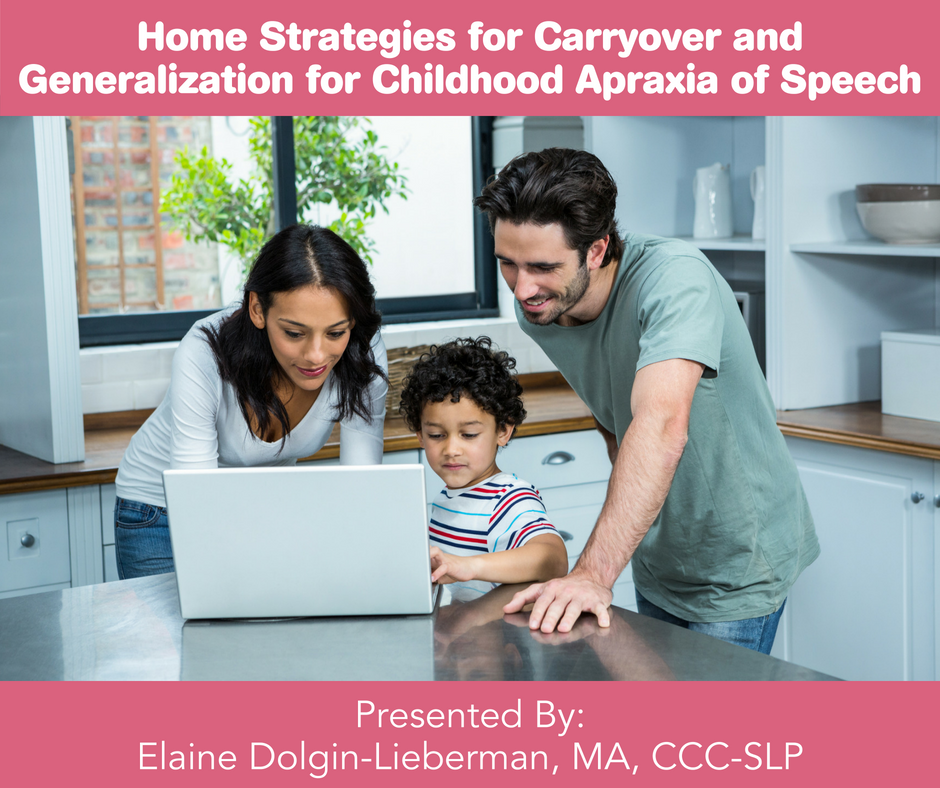 Home Strategies for Carryover and Generalization for CAS
Home Strategies for Carryover and Generalization for CAS
Presented By: Elaine Dolgin-Lieberman, M.A., CCC-SLP
Parent involvement is critical to achieving successful outcomes in children with childhood apraxia of speech. Research conducted by Edal and Gildersleeve-Neumann (2011) found that the more production targets are practiced, the faster a child can acquire the targets and better the chance for generalization. This presentation will focus on ways speech-language pathologists can include parents, families, and caregivers in the therapy process to increase home practice. This can enhance the child’s rate of progress, generalization, and self-esteem that results from their feeling of success and improved speech clarity.
Supporting the Circle: Families, Friends, and Functional Outcomes
Presented by: Heather Rusiewicz, Ph.D., CCC-SLP
The management of childhood apraxia of speech (CAS) often intensely focuses on speech production objectives. While addressing speech sound skills is essential during intervention, it is also important to expand the therapeutic focus beyond the phoneme and even beyond the client. Consideration of the experiences of children with CAS and their families will help lead to more functional outcomes in day-to-day interactions. This presentation will review literature on the impact of CAS and the family unit according to the experiences and perceptions of parents. Ways in which to incorporate the larger family and social circles in patient- and family -centered care practices will be discussed.
Information from our Free Article Library
”What About Sign Language, Speech Tablets, and Other Communication Forms?” is written by a diverse group of contributors and has a large amount of info about the use of sign language and a variety of Augmentative and Alternative Communication options including I-pads and dedicated speech generating devices.
“Apps for Kids with Apraxia” includes a resource list of a variety of apps to use for specific needs of your child.
https://www.apraxia-kids.org/apraxia_kids_library/apps-for-kids-with-apraxia/
“The Importance of Parent Involvement in the Speech Therapy Process” written by Ruth Stoeckel who discusses tips for parents on how to include speech practice at home.
“Can Extended Family and Friends Help?” includes helpful info on sharing about CAS with extended family and friends even while socially distancing.
https://www.apraxia-kids.org/apraxia_kids_library/can-extended-family-and-friends-help/
“Keep Calm and Chatter On” Blog by Ruth Stoekel on how to keep speech going while staying at home.
https://www.apraxia-kids.org/keep-calm-and-chatter-on/
Apraxia Kids has compiled a learning module with information about AAC and home practice.
Free Webinars
 AAC Strategies for Apraxia
AAC Strategies for Apraxia
Presented By: Marleah Herman-Umpleby, M.S., CCC-SLP and Stephanie Ekis, M.S., CCC-SLP
This session will provide 10 easy to implement suggestions for using AAC technology, and supports to encourage language and literacy growth in individuals with childhood apraxia of speech (CAS). The importance of social and meaningful interactions (and not just requests!), literacy development, curriculum supports and resources will all be discussed. Information and valuable tools about being a great communication partner will also be shared to help families and teams provide optimal circumstances for growth, literacy and engagement. AAC does not have to be presented *instead* of use of natural speech for individuals with CAS. Watch this session to learn more about the benefits of using it as a part of a speech and language intervention program!
https://www.apraxia-kids.org/webinar_library/aac-strategies-for-apraxia/
Additional Webinars
Motivating Children with Exciting Apps
Presented By: Erik X. Raj, Ph.D., CCC-SLP
This hands-on course is designed to meet the needs of school-age children and adolescents with various communication difficulties by introducing them to photo-based iPad apps. Through the discussions and demonstrations of the highlighted apps, parents and speech-language pathologists will learn how to manipulate personal photos in an effort to motivate and teach the young learners in their lives.
https://www.apraxia-kids.org/webinar_library/motivating-children-with-exciting-apps/
 Home Strategies for Carryover and Generalization for CAS
Home Strategies for Carryover and Generalization for CAS
Presented By: Elaine Dolgin-Lieberman, M.A., CCC-SLP
Parent involvement is critical to achieving successful outcomes in children with childhood apraxia of speech. Research conducted by Edal and Gildersleeve-Neumann (2011) found that the more production targets are practiced, the faster a child can acquire the targets and better the chance for generalization. This presentation will focus on ways speech-language pathologists can include parents, families, and caregivers in the therapy process to increase home practice. This can enhance the child’s rate of progress, generalization, and self-esteem that results from their feeling of success and improved speech clarity.
Supporting the Circle: Families, Friends, and Functional Outcomes
Presented by: Heather Rusiewicz, Ph.D., CCC-SLP
The management of childhood apraxia of speech (CAS) often intensely focuses on speech production objectives. While addressing speech sound skills is essential during intervention, it is also important to expand the therapeutic focus beyond the phoneme and even beyond the client. Consideration of the experiences of children with CAS and their families will help lead to more functional outcomes in day-to-day interactions. This presentation will review literature on the impact of CAS and the family unit according to the experiences and perceptions of parents. Ways in which to incorporate the larger family and social circles in patient- and family -centered care practices will be discussed.
Information from our Free Article Library
”What About Sign Language, Speech Tablets, and Other Communication Forms?” is written by a diverse group of contributors and has a large amount of info about the use of sign language and a variety of Augmentative and Alternative Communication options including I-pads and dedicated speech generating devices.
“Apps for Kids with Apraxia” includes a resource list of a variety of apps to use for specific needs of your child.
https://www.apraxia-kids.org/apraxia_kids_library/apps-for-kids-with-apraxia/
“The Importance of Parent Involvement in the Speech Therapy Process” written by Ruth Stoeckel who discusses tips for parents on how to include speech practice at home.
“Can Extended Family and Friends Help?” includes helpful info on sharing about CAS with extended family and friends even while socially distancing.
https://www.apraxia-kids.org/apraxia_kids_library/can-extended-family-and-friends-help/
“Keep Calm and Chatter On” Blog by Ruth Stoekel on how to keep speech going while staying at home.
https://www.apraxia-kids.org/keep-calm-and-chatter-on/
Credentials:
Hours of Operation:
Treatment locations:
Address:
,
Phone:
Email:
Overall Treatment Approach:
Percent of CAS cases:
Parent Involvement:
Community Involvement:
Professional consultation/collaboration:
Min Age Treated:
Max Age Treated:
Insurance Accepted:



